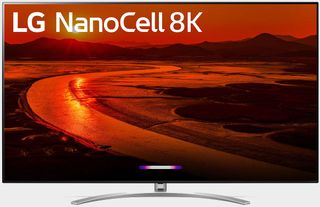LG and Samsung squabble over what constitutes a real 8K display
Meanwhile, I'm still waiting for abundant 4K content.

Display makers are already looking past 4K, and if you really wanted to, you could buy an 8K resolution TV right now (provided you can afford one). I don't recommend doing that, and as far as LG is concerned, Samsung shouldn't even be categorizing its current 8K lineup as 8K. Samsung obviously disagrees, but this apparent tiff could be a precursor of things to come. Hold that thought.
LG's issue is not with the resolution—both LG and Samsung are so far adhering to a 7680x4320 resolution for each company's 8K televisions. What irks LG is the contrast modulation (CM) value, which measures the ability to distinguish a pattern of alternating white and black lines.
"Simply counting pixels fails to capture other important elements of modern display quality, including the resolution the viewer actually sees. Resolution is often confused with horizontal pixel count such 3840 pixels (4K) and 7680 pixels (8K). What’s certain is that a poorly designed display will have lower display quality (i.e. image or text blurriness) even with a high pixel count if adjacent pixels are not clearly distinguishable from one another," LG stated in an announcement.
LG is leaning on the determination of the International Committee for Display Metrology (ICDM), an industry standards organization that develops display performance measurement standards, which says CM values should be 50 percent or higher. Samsung also posted an announcement on ICDM's determination earlier this month.
Going forward, CM figures to play an important role in how 8K TVs are marketed. It's also why things are getting contentious. LG points out that tests measured both its 8K Signature OLED and NanoCell TV lines as having a CM in the 90 percent range, which is well above the 50 percent threshold set forth by the ICDM.
In stark contrast, LG recently called out Samsung's TVs as only having a 13 percent horizontal CM level, as reported by The Korea Herald.
"As the competition within the TV industry intensifies, in order to lead the 8K market, we believe it is important to not just expand the number of models but offer something that meets global standards," said Nam Ho-jun, senior vice president at LG’s Home Entertainment Research and Development Laboratory, according to The Korea Herald. "Otherwise, it will be the consumers who are put at risk by being misled to purchase subpar products thinking they are the best available."
The biggest gaming news, reviews and hardware deals
Keep up to date with the most important stories and the best deals, as picked by the PC Gamer team.
In a press conference of its own, Samsung countered LG's statement by downplaying the importance of CM.
"With the appearance of displays with new technologies —especially 8K—CM no longer represents the overall picture quality," Said Yong Seok-woo, vice president at Samsung’s visual display business. "Brightness, color volume, and other optical factors and processing technologies should be considered."
Samsung took things a step further by placing its own 8K TVs next to LG's 8K TVs and comparing the image quality of a newspaper with small letters. The text was clearer on Samsung's models.
What we have is the foundation for a messy situation sometime in the future. It's a given that not all displays are created equal, but consumers may have to determine what constitutes real 8K versus fake 8K, depending on how this plays out.
Fortunately, there is plenty of time to figure things out. There's still a comparative lack of 4K content, and for gaming specifically, most users are still playing at 1080p. The latest Steam survey shows that around 63 percent of gamers are playing at that resolution, versus less than 2 percent who play at 4K. I imagine it will be quite some time before we have GPUs capable of playing games comfortably at 8K.
Paul has been playing PC games and raking his knuckles on computer hardware since the Commodore 64. He does not have any tattoos, but thinks it would be cool to get one that reads LOAD"*",8,1. In his off time, he rides motorcycles and wrestles alligators (only one of those is true).
Most Popular






